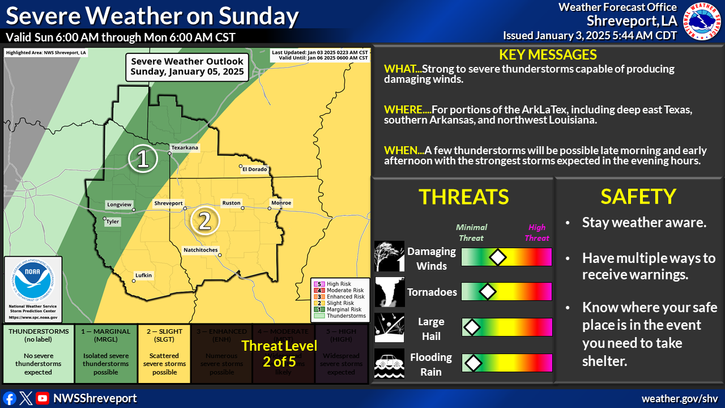Arctic air mass to hit East Texas this week
Published 11:00 pm Saturday, January 4, 2025

- Severe weather is possible Sunday afternoon mainly east of a line from Tyler to Nashville, Arkansas, the NWS said. (Contributed Photo)
East Texas should see rain this week, followed by the arrival of an Arctic air mass that will cause temperatures to plummet to near- or below-freezing levels.
The National Weather Service in Shreveport said it is too soon to tell if there will be any wintry precipitation next week.
Trending
“There are some hints about potential winter weather for the middle of the week, but guidance has been very inconsistent,” the NWS noted in its weekly weather briefing on Thursday.
Severe weather is possible Sunday afternoon mainly east of a line from Tyler to Nashville, Arkansas, the NWS said. All severe hazards are possible, but this severe weather forecast is more uncertain. The NWS said minor threats included wind, hail, tornadoes, heavy rain and flash flooding.
Beginning Monday, elevated, low temperatures are expected for several days.
“There is increasingly high confidence of seeing below normal temperatures across the Southeast U.S. throughout all of next week,” the NWS said. “Right now, slightly higher changes of overnight temps being less than 20 degrees F exist in the northern half of the Four-State region (at least one night in this time period), with less than a 10% chance in the southern half. Although more uncertainty exists, there is a non-zero probability of wintry precipitation coinciding with these colder temperatures. Expect more clarity over the coming days.”
The NWS is encouraging everyone to winterize their homes and businesses: inspect your chimney, insulate your attic, clean out cutters, install and test smoke alarms and carbon monoxide detectors, gather supplies, caulk and weather strip doors and windows, and insulate exposed pipes.
The NWS also noted a wetter-than-normal December wrapped up a wet 2024.
Trending
The average December rainfall is 4.03 inches in Tyler and 4.52 inches in Longview, but the actual December 2024 rainfall was 6.22 inches in Tyler and 6.65 inches in Longview.
The average annual rainfall is 42.10 inches in Tyler and 45.31 inches in Longview, but the actual 2024 rainfall was 46.01 inches in Tyler and 58.62 inches in Longview.






